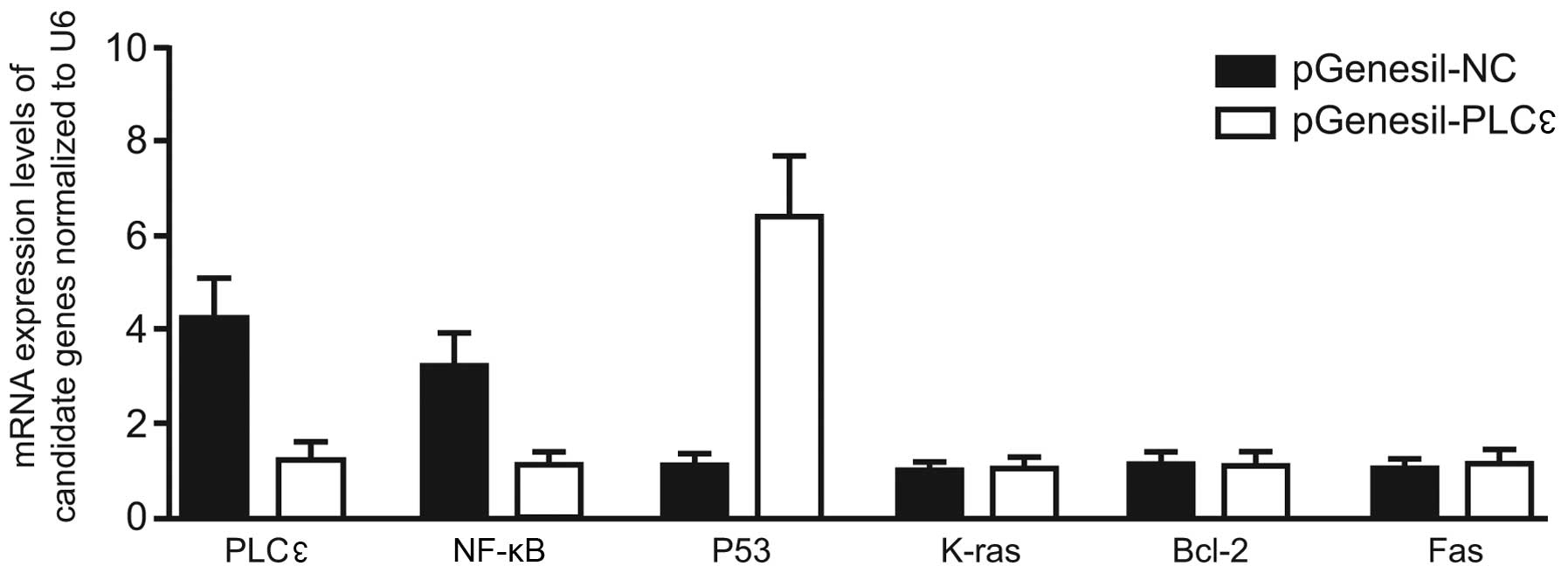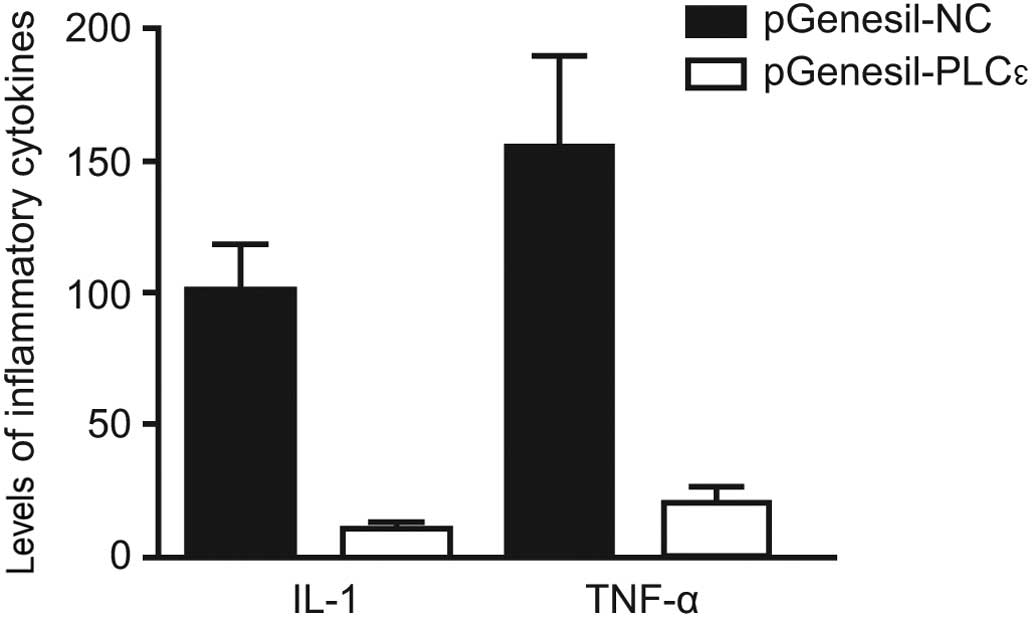|
1
|
Barro-Soria R, Stindl J, Muller C,
Foeckler R, Todorov V, Castrop H and Strauß O:
Angiotensin-2-mediated Ca2+ signaling in the retinal pigment
epithelium: Role of angiotensin-receptor-associated-protein and
TRPV2 channel. PLoS One. 7:e496242012. View Article : Google Scholar : PubMed/NCBI
|
|
2
|
Windischhofer W, Huber E, Rossmann C,
Semlitsch M, Kitz K, Rauh A, Devaney T, Leis HJ and Malle E:
LPA-induced suppression of periostin in human osteosarcoma cells is
mediated by the LPA (1)/Egr-1 axis. Biochimie. 94:1997–2005. 2012.
View Article : Google Scholar : PubMed/NCBI
|
|
3
|
Rodríguez RA, Gundy PM, Rijal GK and Gerba
CP: The impact of combined sewage overflows on the viral
contamination of receiving waters. Food Environ Virol. 4:34–40.
2012. View Article : Google Scholar : PubMed/NCBI
|
|
4
|
Badheka D, Borbiro I and Rohacs T:
Transient receptor potential melastatin 3 is a
phosphoinositide-dependent ion channel. J Gen Physiol. 146:65–77.
2015. View Article : Google Scholar : PubMed/NCBI
|
|
5
|
Sato M, Matsuda Y, Wakai T, Kubota M,
Osawa M, Fujimaki S, Sanpei A, Takamura M, Yamagiwa S and Aoyagi Y:
P21-activated kinase-2 is a critical mediator of transforming
growth factor-β-induced hepatoma cell migration. J Gastroenterol
Hepatol. 28:1047–1055. 2013. View Article : Google Scholar : PubMed/NCBI
|
|
6
|
Cooper KF, Mallory MJ and Strich R:
Oxidative stress-induced destruction of the yeast C-type cyclin
Ume3p requires phosphatidylinositol-specific phospholipase C and
the 26S proteasome. Mol Cell Biol. 19:3338–3348. 1999. View Article : Google Scholar : PubMed/NCBI
|
|
7
|
Barreto RA, Walker FR, Dunkley PR, Day TA
and Smith DW: Fluoxetine prevents development of an early
stress-related molecular signature in the rat infralimbic medial
prefrontal cortex. Implications for depression? BMC Neurosci.
13:1252012. View Article : Google Scholar : PubMed/NCBI
|
|
8
|
Zheng L, Liang P, Li J, Huang XB, Liu SC,
Zhao HZ, Han KQ and Wang Z: ShRNA-targeted COMMD7 suppresses
hepatocellular carcinoma growth. PLoS One. 7:e454122012. View Article : Google Scholar : PubMed/NCBI
|
|
9
|
Bala K, Bosco R, Gramolelli S, Haas DA,
Kati S, Pietrek M, Hävemeier A, Yakushko Y, Singh VV,
Dittrich-Breiholz O, et al: Kaposi's sarcoma herpesvirus K15
protein contributes to virus-induced angiogenesis by recruiting
PLCγ1 and activating NFAT1-dependent RCAN1 expression. PLoS Pathog.
8:e10029272012. View Article : Google Scholar : PubMed/NCBI
|
|
10
|
Kunii N, Zhao Y, Jiang S, Liu X, Scholler
J, Balagopalan L, Samelson LE, Milone MC and June CH: Enhanced
function of redirected human T cells expressing linker for
activation of T cells that is resistant to ubiquitylation. Hum Gene
Ther. 24:27–37. 2013. View Article : Google Scholar : PubMed/NCBI
|
|
11
|
Lee MH, Hammad SM, Semler AJ, Luttrell LM,
Lopes-Virella MF and Klein RL: HDL3, but not HDL2, stimulates
plasminogen activator inhibitor-1 release from adipocytes: the role
of sphingosine-1-phosphate. J Lipid Res. 51:2619–2628. 2010.
View Article : Google Scholar : PubMed/NCBI
|
|
12
|
Brkić L, Riederer M, Graier WF, Malli R
and Frank S: Acyl chain-dependent effect of lysophosphatidylcholine
on cyclooxygenase (COX)-2 expression in endothelial cells.
Atherosclerosis. 224:348–354. 2012. View Article : Google Scholar : PubMed/NCBI
|
|
13
|
Obba S, Hizir Z, Boyer L, Selimoglu-Buet
D, Pfeifer A, Michel G, Hamouda MA, Gonçalvès D, Cerezo M,
Marchetti S, et al: The PRKAA1/AMPKα1 pathway triggers autophagy
during CSF1- induced human monocyte differentiation and is a
potential target in CMML. Autophagy. 11:1114–1129. 2015. View Article : Google Scholar : PubMed/NCBI
|
|
14
|
Kim HS, Hwang YC, Koo SH, Park KS, Lee MS,
Kim KW and Lee MK: PPAR-γ activation increases insulin secretion
through the up-regulation of the free fatty acid receptor GPR40 in
pancreatic β-cells. PLoS One. 8:e501282013. View Article : Google Scholar : PubMed/NCBI
|
|
15
|
Baloucoune GA, Chun L, Zhang W, Xu C,
Huang S, Sun Q, Wang Y, Tu H and Liu J: GABAB receptor subunit GB1
at the cell surface independently activates ERK1/2 through IGF-1R
transactivation. PLoS One. 7:e396982012. View Article : Google Scholar : PubMed/NCBI
|
|
16
|
Matsuda K, Fujishima Y, Maeda N, Mori T,
Hirata A, Sekimoto R, Tsushima Y, Masuda S, Yamaoka M, Inoue K, et
al: Endocrinology. 156:934–946. 2015. View Article : Google Scholar : PubMed/NCBI
|
|
17
|
Stavik B, Tinholt M, Sletten M, Skretting
G, Sandset PM and Iversen N: TFPIα and TFPIβ are expressed at the
surface of breast cancer cells and inhibit TF-FVIIa activity. J
Hematol Oncol. 6:52013. View Article : Google Scholar : PubMed/NCBI
|
|
18
|
Kohga K, Takehara T, Tatsumi T, Ishida H,
Miyagi T, Hosui A and Hayashi N: Sorafenib inhibits the shedding of
major histocompatibility complex class I-related chain A on
hepatocellular carcinoma cells by down-regulating a disintegrin and
metalloproteinase 9. Hepatology. 51:1264–1273. 2010. View Article : Google Scholar : PubMed/NCBI
|
|
19
|
Gaboardi GC, Ramazzotti G, Bavelloni A,
Piazzi M, Fiume R, Billi AM, Matteucci A, Faenza I and Cocco L: A
role for PKCepsilon during C2C12 myogenic differentiation. Cell
Signal. 22:629–635. 2010. View Article : Google Scholar : PubMed/NCBI
|
|
20
|
Sun Q, Weber CR, Sohail A, Bernardo MM,
Toth M, Zhao H, Turner JR and Fridman R: MMP25 (MT6-MMP) is highly
expressed in human colon cancer, promotes tumor growth, and
exhibits unique biochemical properties. J Biol Chem.
282:21998–2010. 2007. View Article : Google Scholar : PubMed/NCBI
|
|
21
|
Spadaro F, Cecchetti S, Purificato C,
Sabbatucci M, Podo F, Ramoni C, Gessani S and Fantuzzi L: Nuclear
phosphoinositide-specific phospholipase C β1 controls cytoplasmic
CCL2 mRNA levels in HIV-1 gp120-stimulated primary human
macrophages. PLoS One. 8:e597052013. View Article : Google Scholar : PubMed/NCBI
|


















